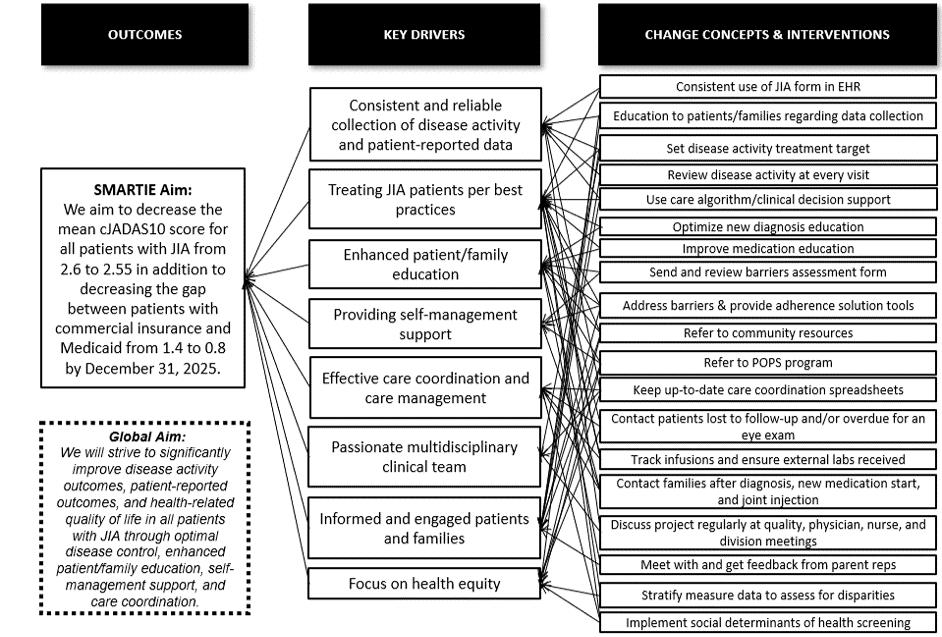Session Information
Session Type: Poster Session A
Session Time: 10:30AM-12:30PM
Background/Purpose: Outcomes for patients with juvenile idiopathic arthritis (JIA) are suboptimal with many patients having active disease, functional limitations, significant pain, and decreased health-related quality of life. We partnered with Integrated Care Solutions (ICS), our population health management subsidiary, on a chronic condition value-based care program with upfront infrastructure funding and an additional performance-based funding opportunity. ICS has 250,000 value-based pediatric lives, which encompasses about 50% of children in the Kansas City metro area. Our aim was to decrease the mean 10-joint clinical Juvenile Arthritis Disease Activity Score (cJADAS10) for patients with JIA from 2.6 to 2.55 in addition to decreasing the gap between patients with commercial insurance and Medicaid from 1.4 to 0.8 by December 31, 2025.
Methods: Three outcome measures were identified – mean cJADAS10 score, active joint count, and patient/parent global assessment of overall wellbeing (PtGA). Interventions were established as our process measures: setting a treatment target of disease activity, JIA care coordination, and ICS care management. Balancing measures of physician and nurse satisfaction were established. Data from our ICS and entire JIA population were portrayed on run/control charts and stratified by insurance type, race, and ethnicity to assess for disparities.
Results: A key driver diagram was created (Figure 1). 184 patients (24.5% of our JIA population) are covered under an ICS network. Targets were established based off of baseline data and performance of a pediatric rheumatology learning health network. A cost and utilization measure was omitted this year due to the low volume of hospitalizations and the lack of reliable attribution of emergency department visits to a patient’s JIA diagnosis. A quality measure dashboard for ICS patients was created (Figure 2), and additional run/control charts for the entire JIA population are tracked monthly. Our team established a new care coordination process to track patients overdue for a rheumatology appointment and to reach out to patients/families after a new JIA diagnosis, new medication start, and/or a joint injection. Baseline disparity assessment noted significant gaps in mean cJADAS10 by insurance type (0.98), race (0.36), and ethnicity (0.1) (Figure 3). Disparities based on insurance type (commercial insurance compared to Medicaid) also noted in mean active joint count (gap=0.82) and mean PtGA (gap=0.2).
Conclusion: We have partnered with our population health management subsidiary to improve outcomes in patients with JIA through a novel value-based care program. We will continue to monitor our quality measures and provide care coordination and care management in hopes of optimizing care delivery and mitigating disparities. We plan to review full cost data for JIA patients to establish a future cost and utilization metric to fully advance value-based care. Furthermore, we hope with achieving our quality measure goals, we will receive funding to support future efforts including enhanced patient/family education, social drivers of health screening, optimization of self-management support, and more.
 Figure 1. Key driver diagram for improving outcomes in patients with JIA.
Figure 1. Key driver diagram for improving outcomes in patients with JIA.
.gif) Figure 2. JIA quality measure dashboard.
Figure 2. JIA quality measure dashboard.
.gif) Figure 3. Run charts assessing for disparities in mean cJADAS10 by insurance type (A), race (B), and ethnicity (C).
Figure 3. Run charts assessing for disparities in mean cJADAS10 by insurance type (A), race (B), and ethnicity (C).
To cite this abstract in AMA style:
Harris J, Fox E, Favier L, Holland M, Parish S, Hoffart C, Ibarra M, Jones J, Harris L, Diederich K, Moran R, Vickers A, Maasen H, Ottaviano L, Baldus C, Potter K, Erpelding M, Quinn S, Cooper A. Improving Outcomes in Patients with Juvenile Idiopathic Arthritis through a Novel Chronic Condition Value-Based Care Program [abstract]. Arthritis Rheumatol. 2025; 77 (suppl 9). https://acrabstracts.org/abstract/improving-outcomes-in-patients-with-juvenile-idiopathic-arthritis-through-a-novel-chronic-condition-value-based-care-program/. Accessed .« Back to ACR Convergence 2025
ACR Meeting Abstracts - https://acrabstracts.org/abstract/improving-outcomes-in-patients-with-juvenile-idiopathic-arthritis-through-a-novel-chronic-condition-value-based-care-program/
